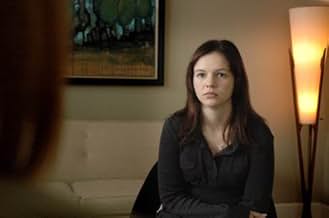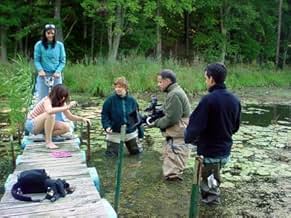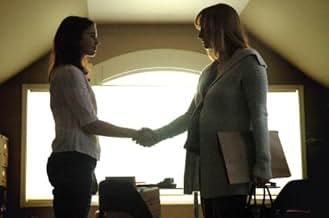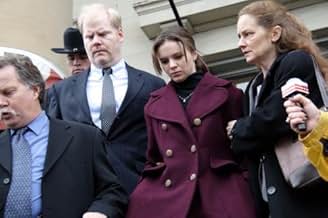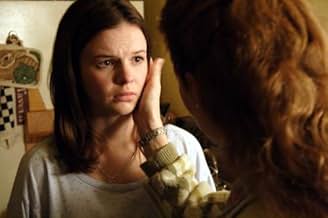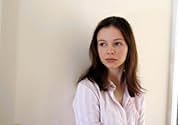CALIFICACIÓN DE IMDb
6.2/10
2 k
TU CALIFICACIÓN
La psicóloga forense Lydie Crane, embarazada, es contratada para averiguar la verdad que se esconde tras el caso de Stephanie Daley, de 16 años, acusada de ocultar su embarazo y asesinar a s... Leer todoLa psicóloga forense Lydie Crane, embarazada, es contratada para averiguar la verdad que se esconde tras el caso de Stephanie Daley, de 16 años, acusada de ocultar su embarazo y asesinar a su bebé.La psicóloga forense Lydie Crane, embarazada, es contratada para averiguar la verdad que se esconde tras el caso de Stephanie Daley, de 16 años, acusada de ocultar su embarazo y asesinar a su bebé.
- Premios
- 5 premios ganados y 5 nominaciones en total
- Dirección
- Guionista
- Todo el elenco y el equipo
- Producción, taquilla y más en IMDbPro
Opiniones destacadas
Knowing through logic or knowing through intuition - and if we suppress what's staring us in the face, how can we find the truth? Such are the elements of a good mystery; and in the case of Stephanie Daley they are also the subject matter.
Tilda Swinton is a forensic psychologist trying to determine if 16 year old Stephanie Daley (Amber Tamblyn) knew she was pregnant. As the girl has just recovered from a horrific experience - we don't find out till later exactly how very horrific - it seems slightly strange that no-one seems overly concerned about her welfare or why it is so crucial to know if she knew. What is even more strange is that all we know is that she wandered down out of a ski resort leaving a trail of blood. The hospital reports that she has recently given birth, that she was 24 weeks pregnant. Swinton's character also happens to be pregnant - 29 weeks. (The legal age when a fetus is considered viable varies but is generally around 24 weeks).
There are snatches of conversation - teeth used to cut the cord - toilet paper embedded in the face. I found myself leaning forward and concentrating, afraid I might miss something, just as one does when listening to a fascinating but quietly spoken person or when eavesdropping.
Liddie Crane (Tilda Swinton) is no stranger to pregnancies gone wrong. We see her watching a baby scan, and learn she has conceived only three months after a stillbirth. An intelligent, professional woman, she is coping with her own state of mind - someone tells her she must not pass on her obvious anxiety to the child. She has fine legal training, but looks back to the time of her last pregnancy when she knew - she just 'knew' - that something was wrong. We believe her, but later watch her discomfort as she realises she is asking Stephanie not if, but how she knew, challenging a certainty that she herself would not be able to explain with logic. Stephanie, at sixteen, shows all the psychological characteristics of a developing teenage mind, sometimes confusing what she 'believes' - she has a Christian faith - with what her intuition is telling her.
Stephanie Crane is part mystery, part psychological drama and, towards the end, a harrowing thriller of unexpected intensity. Without proselytising for one side or the other, it also puts issues such as sex education and the laws regarding sex and minors into stark perspective. The storyline could be seized on to advocate stronger obedience to religious injunctions (Stephanie thinks that when things go wrong that God is punishing her) or to question the whole basis of sex-education influenced by U.S. religious (Christian) beliefs.
At the start of the film, we see an almost colourless landscape - mountains and a few dark trees against limitless snow. As Stephanie comes into view, her clothes and the red marks left from her sluggish feet suggest a possible theme in the use of colour. Most of the times when we catch her subsequently or in flashbacks, she is wearing something red or else the light is strangely subdued. Maybe it could suggest the passion of youth? The novel, Scarlet Letter, is used in Stephanie's class. She concludes, when asked, that is suggests, "it is harder to live a lie than it is to tell the truth and be punished." Modern punishment and retribution echo the novel's storyline in the film's denouement. Colours associated with Liddie, on the other hand, her clothes, her kitchen, bedroom, house and surrounding garden are mostly the greenish palette of nature. Liddie herself usually wears some green or blue, both relaxing, reassuring colours.
Strong white is used twice in the film in key scenes: at one point, Stephanie is ascending the stairs into bright light (but when we continue upstairs there is only darkness). The other time is the brilliant whiteness of her church. The two key lovemaking scenes also seem linked by the way the colours are distorted by near darkness. In both cases there is joyous consent, but in each case the woman has very different thoughts about the man involved as subsequent events come to light.
In one interesting scene in the schoolroom, the youngsters having learnt about 'making babies' and encouraged to use baby beepers to better understand when a baby needs frequent attention, the teacher turns to the topic of 'not making babies' and invites the class for input. One young man, to the amusement of his classmates, says, 'A condom?' the teacher replies that, although she would like to agree with him, the only official answer the school board will allow her to give is abstinence.
Denial is another element of Stephanie Daley. Is she denying the truth to herself? Does Liddie deny her woman's intuition in favour of legal niceties? Stephanie's mother wants all the fuss to be over quickly. Psychologically, it is as if she is denying anything terrible has happened.
Tilda Swinton's career, apart from the odd glitch, has shown a remarkable aptitude for including challenging films. This film, like many of her consummate characters, may not receive the immediate recognition it deserves, but that does not detract from it being complex, ingenious and very intelligently woven. Her character, like the brilliant script by director-writer Hilary Brougher, rewards every bit of study and attention you might wish to give it. Unlike the young teenager she is interviewing, Liddie has developed both the objective and intuitive parts of her character to a mature level. When they come into conflict at the end of the film, the interior struggle just for a moment slips out from her professional façade. But of all the images that remain after viewing, it is the solitary anguish of Amber Tamblyn, her own hand over her face to muffle a scream, that will haunt you for days afterwards.
Tilda Swinton is a forensic psychologist trying to determine if 16 year old Stephanie Daley (Amber Tamblyn) knew she was pregnant. As the girl has just recovered from a horrific experience - we don't find out till later exactly how very horrific - it seems slightly strange that no-one seems overly concerned about her welfare or why it is so crucial to know if she knew. What is even more strange is that all we know is that she wandered down out of a ski resort leaving a trail of blood. The hospital reports that she has recently given birth, that she was 24 weeks pregnant. Swinton's character also happens to be pregnant - 29 weeks. (The legal age when a fetus is considered viable varies but is generally around 24 weeks).
There are snatches of conversation - teeth used to cut the cord - toilet paper embedded in the face. I found myself leaning forward and concentrating, afraid I might miss something, just as one does when listening to a fascinating but quietly spoken person or when eavesdropping.
Liddie Crane (Tilda Swinton) is no stranger to pregnancies gone wrong. We see her watching a baby scan, and learn she has conceived only three months after a stillbirth. An intelligent, professional woman, she is coping with her own state of mind - someone tells her she must not pass on her obvious anxiety to the child. She has fine legal training, but looks back to the time of her last pregnancy when she knew - she just 'knew' - that something was wrong. We believe her, but later watch her discomfort as she realises she is asking Stephanie not if, but how she knew, challenging a certainty that she herself would not be able to explain with logic. Stephanie, at sixteen, shows all the psychological characteristics of a developing teenage mind, sometimes confusing what she 'believes' - she has a Christian faith - with what her intuition is telling her.
Stephanie Crane is part mystery, part psychological drama and, towards the end, a harrowing thriller of unexpected intensity. Without proselytising for one side or the other, it also puts issues such as sex education and the laws regarding sex and minors into stark perspective. The storyline could be seized on to advocate stronger obedience to religious injunctions (Stephanie thinks that when things go wrong that God is punishing her) or to question the whole basis of sex-education influenced by U.S. religious (Christian) beliefs.
At the start of the film, we see an almost colourless landscape - mountains and a few dark trees against limitless snow. As Stephanie comes into view, her clothes and the red marks left from her sluggish feet suggest a possible theme in the use of colour. Most of the times when we catch her subsequently or in flashbacks, she is wearing something red or else the light is strangely subdued. Maybe it could suggest the passion of youth? The novel, Scarlet Letter, is used in Stephanie's class. She concludes, when asked, that is suggests, "it is harder to live a lie than it is to tell the truth and be punished." Modern punishment and retribution echo the novel's storyline in the film's denouement. Colours associated with Liddie, on the other hand, her clothes, her kitchen, bedroom, house and surrounding garden are mostly the greenish palette of nature. Liddie herself usually wears some green or blue, both relaxing, reassuring colours.
Strong white is used twice in the film in key scenes: at one point, Stephanie is ascending the stairs into bright light (but when we continue upstairs there is only darkness). The other time is the brilliant whiteness of her church. The two key lovemaking scenes also seem linked by the way the colours are distorted by near darkness. In both cases there is joyous consent, but in each case the woman has very different thoughts about the man involved as subsequent events come to light.
In one interesting scene in the schoolroom, the youngsters having learnt about 'making babies' and encouraged to use baby beepers to better understand when a baby needs frequent attention, the teacher turns to the topic of 'not making babies' and invites the class for input. One young man, to the amusement of his classmates, says, 'A condom?' the teacher replies that, although she would like to agree with him, the only official answer the school board will allow her to give is abstinence.
Denial is another element of Stephanie Daley. Is she denying the truth to herself? Does Liddie deny her woman's intuition in favour of legal niceties? Stephanie's mother wants all the fuss to be over quickly. Psychologically, it is as if she is denying anything terrible has happened.
Tilda Swinton's career, apart from the odd glitch, has shown a remarkable aptitude for including challenging films. This film, like many of her consummate characters, may not receive the immediate recognition it deserves, but that does not detract from it being complex, ingenious and very intelligently woven. Her character, like the brilliant script by director-writer Hilary Brougher, rewards every bit of study and attention you might wish to give it. Unlike the young teenager she is interviewing, Liddie has developed both the objective and intuitive parts of her character to a mature level. When they come into conflict at the end of the film, the interior struggle just for a moment slips out from her professional façade. But of all the images that remain after viewing, it is the solitary anguish of Amber Tamblyn, her own hand over her face to muffle a scream, that will haunt you for days afterwards.
I have no idea why this film, or many of the other Sundance films for that matter, are rated so low on IMDb. It's a shame, because this is a remarkable film.
Amber Tamblyn gives the best performance of her career and deserves an Oscar for her subtle, eerie picture of teenage confusion, fear and malice. Tilda Swinton is also very good as the detective investigating Daley's case, and both Melissa Leo and Timothy Hutton give solid backup.
See this movie - it is a frightening and eye-opening portrait of real life. ****/*****
Amber Tamblyn gives the best performance of her career and deserves an Oscar for her subtle, eerie picture of teenage confusion, fear and malice. Tilda Swinton is also very good as the detective investigating Daley's case, and both Melissa Leo and Timothy Hutton give solid backup.
See this movie - it is a frightening and eye-opening portrait of real life. ****/*****
I watched it Saturday, along with all the special features. It was a tough movie. If you don't like indie film, you might have a hard time with it. If you do, it's an astonishing achievement. All the acting is uniformly excellent. I don't mean to undercut the obviously painstaking work Tilda Swinton did in creating her character...
...but this is Amber Tamblyn's movie. Period. Anyone who watched Joan Of Arcadia already knew she could act her heart out. But what she does here is nothing short of phenomenal. She gets every nuance of Stephanie --- someone VERY different from her own flaky, artsy hippie-chick personality --- absolutely right. There's not one minute of "acting" in her time on screen. I promise you that if you give yourself to this story you will not come out of it the same.
And you will not soon forget it.
...but this is Amber Tamblyn's movie. Period. Anyone who watched Joan Of Arcadia already knew she could act her heart out. But what she does here is nothing short of phenomenal. She gets every nuance of Stephanie --- someone VERY different from her own flaky, artsy hippie-chick personality --- absolutely right. There's not one minute of "acting" in her time on screen. I promise you that if you give yourself to this story you will not come out of it the same.
And you will not soon forget it.
It is strange how people can have a gigantic Hollywood budget, the whole powerful studio support system and churn clunker after clunker. Then someone like the director of this small independent flick, with a minuscule amount of money makes a compelling piece of art. Small town in unidentified part of America, could have been anywhere, with gloomy colorless landscape. Boring, predictable lives, unfulfilled promises, church on Sundays, unspoken words hanging in the air. Makes you want to run for your life.But where can you run? " Stephanie Daley" is an unflinching, sometimes hard to watch movie. Takes us to places we don't want to go, makes us remember things we'd like to forget. I am not sure Hollywood has a place for Hilary Brougher. People who have something to say can be nuisance. They can force us to think, and we can't have that,can we.
This is an American independent film starring Tilda Swinton, of which she was also an Executive Producer. The film is largely shot in natural light with very good and versatile hand-held cinematography, but the disadvantage of that is that many scenes are so badly lit that they are far too dark. And sometimes the cast do not articulate sufficiently for everything they say to be understood; this is of course in complete contrast to the perfect articulation of the highly-trained Tilda Swinton herself, who plays a forensic psychologist conducting a pre-trial examination of a girl being tried for murdering her illegitimate baby at birth. Swinton is very good, as she always is. The girl being interviewed is pregnant and so is Swinton, and Swinton has her own deep issues and also her own secret. So there is an ingenious parallelism going on here. Both of them are struggling with a pregnancy, one of 26 weeks and the other of 29 weeks, and both have really big issues and are guilty of concealment. The film is directed by a woman, Hilary Brougher, and is sensitively approached by females for females, thus avoiding any contamination by male prurience. In fact, many men would not be interested in seeing this film, so far is it from their 'world', and thus so entirely incomprehensible to the more macho types. The world of pregnancy is pretty much a closed female world rarely entered into by men, except for those husbands who like to share the experience with their wives. Amber Tamlyn plays the young girl with convincing intensity, and was aged 19 but looking much younger. This is a powerful film.
¿Sabías que…?
- TriviaSundance Lab Project
- ErroresTodas las entradas contienen spoilers
- Citas
Stephanie Daley: What if what I believe turns out not to be true?
Lydie Crane: Then stop believing it.
Selecciones populares
Inicia sesión para calificar y agrega a la lista de videos para obtener recomendaciones personalizadas
- How long is Stephanie Daley?Con tecnología de Alexa
Detalles
- Fecha de lanzamiento
- País de origen
- Sitio oficial
- Idioma
- También se conoce como
- Stephanie Daley
- Locaciones de filmación
- Productoras
- Ver más créditos de la compañía en IMDbPro
Taquilla
- Total en EE. UU. y Canadá
- USD 25,751
- Fin de semana de estreno en EE. UU. y Canadá
- USD 3,401
- 22 abr 2007
- Total a nivel mundial
- USD 25,751
- Tiempo de ejecución1 hora 32 minutos
- Color
- Mezcla de sonido
- Relación de aspecto
- 1.85 : 1
Contribuir a esta página
Sugiere una edición o agrega el contenido que falta

Principales brechas de datos
By what name was El caso Daley (2006) officially released in India in English?
Responda

